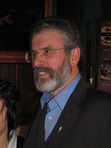Gerry Adams's Blog, page 51
October 13, 2015
Expressions of sympathy following weekend tragedies
Last weekend the Carrickmines fire claimed 10 victims. On Sunday a homeless man died on the streets of Dublin and later that evening Garda Tony Golden was murdered and Siobhan Phillips was critically wounded in a shotting in the Omeath, County Louth.
On Tuesday Dáil parties expressed their condolences.
Expressions of Sympathy – Gerry Adams TD
Ba mhaith liom mo chomhbhrón a dhéanamh le teaghlach agus cairde na ndaoine a fuair bás sa tine ar an Charraig Maoinis ar oíche Shathairn; agus do chlann agus cairde an Gharda Anthony Golden a dunmharú ar oíche Dhomhnaigh le clann Adrian Mackin, do Shiobhán Phillips agus a clann féin agus don duine gan dídeán a fuarthas marbh ag doras ar shráid Westmoreland maidin Domhnaigh.
The weekend tragedies in Carrickmines, in Dublin, and in county Louth have stunned and saddened citizens across this state and beyond.
The deaths of ten citizens, many of them children, on a Traveller halting site in a horrifying fire, another apparent death of a homeless man in the capital, and the brutal murder of Garda Anthony Golden and wounding of Siobhan Phillips have left families bereaved and traumatised, and communities numb with shock and disbelief.
On behalf of Sinn Féin I want to extend my sincerest condolences to the extended families of Thomas and Sylvia Connors, their children Jim, Christy and Mary (who was aged just six months), William Lynch, his partner Tara Gilbert, their children Jodie and Kelsey, and William’s brother Jimmy. Tara was also pregnant with their third child.
I also want to express our condolences to the entire Traveller Community. Two families were devastated in a tragedy that has drawn universal sympathy and understanding.
Today is a moment for the Dáil to stand in solidarity with the Traveller community. But we have to do more than that.
It is time also for that solidarity to be extended beyond rhetoric and into practical expressions.
Since the events of last Saturday morning disturbing information has come to light about the conditions on halting sites across the state and the lack of investment by government and local authorities in safe accommodation for Travellers.
The Carrickmines site was overcrowded. 29 people were sleeping in cabins and caravans at the time of the fire.
Dún Laoghaire-Rathdown County Council is one of 15 local authorities that accessed no state funding for Traveller accommodation this year.
In the last 7 years funding for accommodating the travelling community was cut by 93%.
Even in difficult times this is unacceptable.
The treatment of the Traveller community would suggest that local authorities and government do not prioritise accommodation for travellers in the way they should.
I welcome the decision by Dublin Mayor Críona Ní Dhálaigh to establish an urgent review of fire safety at all halting sites run by Dublin City Council.
I also welcome the announcement today by the Dept of Environment that all local authorities must now hold audits on safety at halting sites.
This audit needs to be independent. It needs to include all accommodation for the Traveller community. There also needs to be a moratorium on the Trespass Act.
It is important that the heartbreak caused by the calamity in Carrickmines galvanises government and local authorities to prioritise living accommodation for Travellers so that the tragedy of Carrickmines is never repeated.
The morning after the Carrickmines fire the body of a homeless man in his thirties was found in the doorway of a shop in Westmoreland Street.
While the circumstances of his death are still not entirely clear I offer our condolences to his family and friends.
Ba mhaith liom mo chomhbhrón a dhéanamh le bean agus le clann Garda Tony Golden agus cúnamh a thabhairt dá chomrádaithe sa Gharda Síochána agus seasamh leo. Ar dheis Dé go raibh a anam.
Garda Tony Golden was murdered in Omeath. On behalf of Sinn Fein I want to extend my sympathies and solidarity to his family, friends and many comrades in An Garda Síochána.
Garda Golden was a respected, dedicated Garda officer who was deeply embedded in the community of Omeath and the Cooley peninsula. On Sunday he was going about his work as a Garda serving the community. He was brutally killed as he helped a young woman, a mother, who was the victim of domestic abuse and violence.
Today this Dáil rightly pays tribute to his courage, his dedication and his selflessness. He is a hero.
Adrian Mackin who tried to murder his partner and who then brutally killed Garda Tony Golden was allegedly a violent dissident.
Four years ago so-called dissidents killed PSNI Constable Ronan Kerr. His mother Nuala speaking then said:
“We all need to stand up and be counted and to strive for equality. We don’t want to go back to the dark days again of fear and terror.”
Nuala Kerr was right. She was right four years ago and her words are right for today. None of these groups have anything positive to offer society.
On behalf of the people of Louth and of Sinn Féin I want to make it clear that we have no time for those who exploit and disgrace the proud tradition and noble calling of republicanism for their own self-serving and selfish ends.
These people are the enemies of republicanism. They are the enemies of the peace process.
If there are any rational people involved with these violent groups; the aftermath of the killing of Garda Golden and the wounding of Siobhan Philips presents an opportunity for them to do the right thing.
Leave. Bígí imithe. Do it now.
I want to offer my sympathies to An Garda Síochána who on Sunday evening lost a much respected and esteemed member of their service. Bhí Tony Golden gníomhach sa phobal, ball den Chumann Lúthchleas Gael agus sa scéim Pobal ar Aire, scéim a thacaíonn Sinn Féin go láidir leis.
Tá Contae an Lú agus an tír ar fad thíos leis mar gheall ar an tragóid seo.
For the second time in three years the people of the Cooley peninsula and the Gardaí are grieving for an officer who served his community with distinction and integrity.
We all remember the vicious slaying three years ago of Garda Adrian Donohoe. Another Garda serving the community and gunned down by criminals.
There are real questions about the lack of Garda resources in County Louth; questions about the government’s commitment to policing in rural Ireland.
There are also questions about the DPP and PPS not pursuing charges even when significant evidence is available.
There are questions about some of those within violent dissident groups who are agents of the police or the intelligence services.
But these are for another day.
Today is a day to show an appreciation of the work of An Garda Síochána and particularly Garda Anthony Golden.
To his family and to all of those others who have lost loved ones in An Garda Siochána I offer my condolences.
Published on October 13, 2015 08:15
October 9, 2015
Our man in Havana
The sun was shining gloriously in a clear blue sky last Friday in Havana. It was a hot and humid Cuban morning. Our small delegation – myself, Lucilita Bhreatnach, Eric Scanlon and Richard McAuley – walked the short distance from our cars to the hunger strike memorial in Parque Victor Hugo - a beautiful park in central Havana - named after the author of Les Miserables.
I was first there just before Christmas in 2001 to unveil the memorial which was erected to mark the 20th anniversary of the 1981 hunger strike. The hunger strike clearly had a significant impact on the people of Cuba. On September 15 1981, during the hunger strike, Fidel Castro addressing the 68th conference of the Interparliamentary Union in Havana said: “In my opinion Irish patriots are writing on the most heroic chapters in human history. They have earned the respect and admiration of the world and likewise they deserve its support. Ten of them have died in the most moving gesture of sacrifice, selflessness and courage one could ever imagine.” Part of his remarks are inscribed on the memorial.
The Sinn Féin delegation was joined in our celebration by a small crowd of Cuban activists, some of whom were involved in solidarity work at that time, as well as representatives of the Cuban Communist Party.
It was a poignant moment. Friday was October 2nd. It was almost 34 years to the day - October 3rd 1981 - when the hunger strike ended.
The Stailc Ocrais (hunger strike) has since become a metaphor for Ireland’s long struggle for freedom and independence. I reminded my Cuban audience that “it was an epic story of unselfishness, courage and generosity versus self-interest, intransigence and imperialism. Though it ended in the deaths of 10 prisoners and countless other people outside the prison it was a triumph for human dignity and the human spirit.
That same spirit is visible here in Cuba and everywhere stronger powers refuse to recognise that people have the right to be who we are. It is visible when stronger powers try to grind down those who have different more egalitarian values. The people of Cuba have been vindicated by the change of US policy recently and while that will present many challenges, such challenges are part of revolutionary struggle.”
I concluded my remarks by stating my belief that the hunger strikers would be pleased that this memorial stands in Havana. They would also be pleased by the changes that are evident in Cuba’s economy and in the quality of life of its citizens. Clearly the embargo still makes life very difficult but the Cuban people have demonstrated a remarkable resourcefulness in circumventing this obstacle. For example, major progress has been made in developing Cuba’s economy; in introducing new tax laws and a labour code, and in the creation of huge deepwater sea port, and special economic development zone at the port of Mariel, just west of Havana.
Tourism too has expanded significantly since I was last here. And the relaxation in some of the restrictions on US visitors by President Obama has seen an increase in travellers arriving from there. Many are coming to visit families but others have come to enjoy Cuba’s rich history; its cultural diversity; its great weather and beaches; and the warmth of its people.
Some have also come to look at or travel in the fleet of 1950s American cars that are a regular sight on Havana’s roads. They come in all shapes and sizes and colours. Some, even after 60 years, are still immaculate. They look as fresh as the day they came off the assembly line in Detroit.
Havana is famous for its streetscape of old buildings and castles. Some dating back to the early 16th century. Its’ museums have reminders of gold and silver plundered by Spanish adventurers and monarchs from central and south America, as well as Cuba. The Museum of the Revolution is in Old Havana and in what was the Presidential Palace of all Cuban presidents. It contains many artefacts and photographs from the revolutionary period, including in a glass building beside the museum the Granma – the 60 foot yacht that was used to transport Fidel and 80 fighters from Mexico to Cuba in 1956 at the start of the revolution.
In one glass case is an instrument that was used to tear off the fingernails of prisoners while in another there is a photograph of a crowd of smiling revolutionary prisoners – not unlike smuggled photographs from within Long Kesh and Armagh Women’s prison in our own time. A guitar, with the names of political prisoners written across it, is another reminder of the similarities of prison struggle between Cuba and Ireland. The museum is currently under renovation and the guide who brought us around proudly showed us the bullet holes in the walls that were revealed during the restoration process.
Last week’s visit was an opportunity to build on the close ties of solidarity that Irish republicans and many Irish people share with the people of Cuba. It also came on the back of a very successful visit to Cuba by Pope Francis and the major breakthrough in Cuban – US relations. In the course of a very busy schedule I met senior political leaders in the Cuban government, including Cuban Vice President Salvador Antonio Valdés Mesa, as well as a the Minister for Health; the Minister for Foreign Trade; the Deputy Minister for Foreign Affairs and senior figures from the People’s National Assembly and the Central Committee.
Our conversations ranged across international affairs and the role of Cuba in the world today, including its medical aid to other countries. The recent thaw in relations between Cuba and the United States dominated much of our discussions.
While US President Obama has taken steps to ease some of the more punitive aspects of the embargo most of the really important elements of it are written into US law and need the Congress to introduce the necessary enabling legislation to finally bring an end to the embargo, as well as to close the U.S. base at Guantanamo Bay and return it to the Cuban people.
Sinn Féin has consistently opposed the embargo imposed by the USA. Its economic, cultural and human cost on the people of Cuba has been enormous. The interests of Latin America and especially of Cuba and the USA are best served by an end to the embargo and the creation of a new relationship based on mutual respect and equality. Key to the progress we have witnessed thus far has been the leadership of President Raul Castro and President Obama.
On October 27th Cuba will introduce its annual motion to the United Nations calling for an end to the embargo. How the US responds will be an important indicator.
Finally, I also took the opportunity to publicly and privately commend Cuba's role in facilitating the Colombian peace process. The recent press conference in Havana, hosted by President Raul Castro, at which Colombian President Juan Manuel Santos and the leader of the Farc rebel group Timochenko shook hands, was a remarkable breakthrough after many yearsof effort. They have now set six months in which to achieve a final agreement.
Finally, finally I left Cuba impressed by the candour and determination of the Cuban people and their political leadership. All of those I spoke to made clear their willingness to construct a new relationship with the USA but there was an equal determination not to compromise on the principles of the revolution.
Published on October 09, 2015 15:08
September 25, 2015
Remembering Tomás Ceannt – soldier, patriot, revolutionary
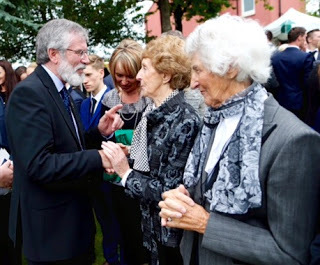 Mise agus nieces of Tomás Ceannt On a bright May morning in 2000 I spoke at the unveiling of a memorial in Cork City to the 1916 patriot Tomás Ceannt at Ceannt railway station. The Ceannt Memorial had been commissioned and erected by a committee of railway workers and was unveiled by Kathleen Ceannt, a niece of Tomás Ceannt.
Mise agus nieces of Tomás Ceannt On a bright May morning in 2000 I spoke at the unveiling of a memorial in Cork City to the 1916 patriot Tomás Ceannt at Ceannt railway station. The Ceannt Memorial had been commissioned and erected by a committee of railway workers and was unveiled by Kathleen Ceannt, a niece of Tomás Ceannt. Last Friday the sun shone brightly down again as I laid a wreath at the memorial and later at St. Nicholas’s Church in Castlelyons in north county Cork where the Ceannt family, their friends and neighbours and thousands of admirers of Tomás Ceannt took part in his historic state funeral. For the last 99 years Tomás – sometimes referred to as ‘The Forgotten Volunteer’ - has lain in a shallow unmarked grave behind the walls of Cork prison. He was one of only two of the 1916 patriots to be executed outside of Dublin. The other was Roger Casement who was hanged in London.
But in truth he was never forgotten. Not by his family and not by republicans who have celebrated his life and death, and those of the other patriots of 1916, each year since 1916. Nor is he the only Irish republican prisoner executed by the British and buried in the grounds of a prison. Just months before I spoke at the unveiling of the Cork station memorial in 2000 the remains of Tom Williams were finally laid to rest in a family plot in Milltown Cemetery in west Belfast. Tom Williams was only 19 years of age when he was executed in Crumlin Road Jail. A massive campaign, which included a 200,000-signature petition, to secure his reprieve was ignored by the British and Stormont authorities and the execution went ahead on 2 September 1942. Like Tomás Ceannt the body of Tom Williams had lain buried in an unmarked grave within the prison walls for 58 years.
The Manchester Martyrs continue to lie in unmarked graves in New Bailey prison in Manchester. William Allen, Michael Larkin and Michael O’Brien were hanged in November 1867 for their part in an ambush to free two Fenian leaders. Their bravery in the course of an infamous show trial, their cry of ‘God Save Ireland’ from the dock, and their resolve and courage in the face of death sentences are the stuff of legend.
Tomás Ceannt was born in 1865 at Ban Ard House, Castlelyons, one of nine children. As a young man he emigrated to the United States but returned in his mid-20s and became actively involved in the Land War. The Ceannt family had long been active in agitation against British rule, the Land War and a cousin was involved in the Fenian 'dynamite campaign' in Britain. Tomás was also a member of Cumann Lúthchleas Gael (GAA) and the Gaelic League.
In 1914 Tomás and his brothers were among the first recruits to the Cork Brigade of the Irish Volunteers and they formed the core of that body in the area with Tomás becoming commandant of the Galtee Battalion in 1916. In February 1916 he was imprisoned for two months for agitation. Immediately on his release, he resumed his activities. As preparations got underway for the 1916 Rising, the Irish Volunteers in the East Cork area were led by Tomás Ceannt and Terence McSwiney
However, Eoin MacNeill's countermanding order to the Volunteers not to rise at Easter caused great confusion amongst their ranks outside Dublin. The failure of Roger Casement to get weapons through also meant there was a chronic lack of arms. The Ceannts and their local Volunteer company decided to secure what arms they had and to go into hiding.
When they heard that the Rising in Dublin was over, the brothers decided to return home on the night of 1st May. Early the next morning, the house was surrounded by a party of RIC (Royal Irish Constabulary) who demanded their surrender.
Despite being armed with only one rifle and three shotguns, the brothers gave no consideration to surrender. A fierce gunfight ensued. The Ceannt brothers were supported by their 84-year-old mother who loaded the guns. One brother, David, was injured, and RIC Head Constable Rowe was shot dead. The Ceannt’s were all captured when they ran out of ammunition.
The RIC lined them up against the farmhouse wall and only the intervention of a medical officer prevented their immediate execution. As they were being led away, Richard Ceannt attempted to escape across the fields but was fatally wounded in the back.
Tomás was taken to Cork Detention Barracks where he was strictly isolated from the other prisoners. There is a famous photograph of him and his brother William walking across the bridge at Fermoy. The hands of both are tied and Tomás is in his stockinged feet. They are accompanied by a British Army officer and three British Army soldiers shouldering rifles with bayonets attached. Behind them is a horse and cart in which it is believed lay the wounded David and Richard and their mother.
Tomás Ceannt was charged with ‘waging war against His Majesty the King’ quickly court-martialled and sentenced to death. He was shot by firing squad on May 9th in Victoria Barracks, now Cork Prison by a British naval detachment from Cobh. He died, in the words of the British officer in charge, "very bravely, not a feather out of him''.
The British had by that stage already executed 12 of the leaders, including Tom Clarke, and Padraig Pearse. Tomás Ceannt’s execution was followed three days later, on May 12th, by those of James Connolly and Sean MacDiarmada and finally by Roger Casement on August 3rd.
The executions caused profound shock and there was rising anger across the country. The reaction of many Irish people was summed up by the writer George Bernard Shaw in a letter to the Daily News:
"My own view... is that the men who were shot in cold blood after capture or surrender were prisoners of war, and that it was, therefore, entirely incorrect to slaughter them.
"The shot Irishmen will now take their places beside Emmett and the Manchester Martyrs in Ireland and beside the heroes of Poland and Serbia and Belgium in Europe; and nothing in heaven and earth can prevent it.''
That is the calibre, spirit and fearless determination of the man re-interred last Friday. Like many other men and women before and since Tomás Ceannt demonstrated incredible courage and selflessness in the struggle to free Ireland from British occupation.
Enda Kenny in his oration at the graveside was right when he said that “Ireland needs people who believe in their community, their country and in putting others before themselves” but his Ireland is 26 counties. His remarks are set in the context of partition and ignore the reality that a part of Ireland is still under the control of the British government.
The approach of the Fine Gael/Labour Government to this Centenary has been shallow and wholly self-serving. Tomás Ceannt engaged directly in revolutionary armed activity against British rule in Ireland. He was what many successive Dublin Governments would have termed a 'gunman'.
Unlike the Government, Sinn Féin makes no apology for recognising this fact. We salute Tomás Ceannt's stand and will not attempt, like the Labour leader Joan Burton, to re-write history to fit narrow party political objectives or to misrepresent the facts.
This Government has nothing in common with men like Ceannt, nor any intention of promoting the ideals to which he dedicated his life. The Government's Centenary commemorative events will not discuss the unfinished business of securing the full independence of Ireland. They will not seek to debate the failure of partition.
Nor will they seek to debate the ideals of social equality which are at the heart of the 1916 Proclamation.
They do not wish people to be reminded of the unfinished business of the Rising and the struggle for independence. The most fitting tribute to Tomás Ceannt and to the men and women of 1916 is to deliver the type of republic promised on the steps of the GPO on Easter Monday 1916 - a sovereign, 32-County republic in based on the principles of equality and social justice.
Published on September 25, 2015 20:03
September 22, 2015
Addressing the Dublin Chamber of Commerce
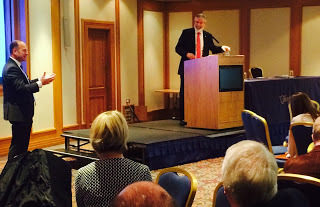
This morning I spoke to a breakfast meeting of Dublin Chamber of Commerce and set out some of the party’s plans for business and the economy and Sinn Fein's vision for Dublin. Below is the text of my remarks to the Chamber.
A chairde,
Ba mhaith liom fáilte a chur roimh Chomhairle Trádála Bhaile Átha Cliath.
I would like to open my remarks by extending warmest congratulations to the Dublin football team on their marvellous victory in the All-Ireland Final. Comhghairdeas!
Commiserations of course to worthy opponents Kerry.
Dublin
Dublin is a proud city with a long and illustrious history.
Many key events in the history of the nation happened here. It was site of the Easter Rising, the Centenary of which we will commemorate next year.
Dublin is also internationally renowned for its contribution to literature and has produced many prominent literary figures, including Nobel laureates Yeats, Shaw and Beckett.
Other influential Dublin writers and playwrights include Wilde, Swift, Stoker, Synge, O'Casey, Behan, Maeve Binchy, and Roddy Doyle.
Of course Dublin is arguably best known as the location of the greatest works of James Joyce, including Ulysses, which is set in the city.
Reputedly one of Europe's most youthful cities, with an estimate of 50% of citizens being younger than 25, Dublin is also the centre of the political media and communications activity on the state.
The Dublin region has always been the economic centre of the state and is now home to large numbers of global pharmaceutical, information and communications technology companies, with many having their European headquarters or operational bases in the city.
Dublin's challenges
Like many large, capital cities across the world, Dublin faces particular infrastructural and environmental challenges.
A lack of strategic integrated planning – a multi-agency approach - has been a feature of the city's growth over the decades. This has created many problems for those who live, work and visit Dublin.
The city is choked by traffic gridlock, and a big issue for Dublin businesses is the lack of an integrated public transport system, despite the investments of recent years.
Workers living on one side of the city, or from neighbouring counties (like Louth) must have a car in order to travel to work.
Years of underinvestment in water infrastructure threatens future supplies with serious implications for businesses and householders.
I know that Dublin Chambers is specifically focussed on Dublin’s water supply for the longer term.
Householders and businesses in Dublin face the prospect of water rationing unless the supply crisis is tackled.
Dublin's population is expected to rise from the current 1.5 million, to 2.15 million by 2050. Water demand in Dublin and outlying regions is expected to grow by that time.
The existing water infrastructure - much of it built more than 100 years ago - is not capable of delivering extra capacity.
Sinn Féin is very conscious of this crisis and we understand the need to invest and expand our water services and believe this can and should be done under the control and direction of a democratically accountable body.
Dublin also faces challenges if it is to become an inclusive and equal city. There is much social deprivation, poverty and problems associated with drug addiction and crime.
There is a chronic lack of social housing and recent years have witnessed huge increases of people sleeping rough with some dying as consequence. This cannot continue.
Like many European cities Dublin now faces the challenge of accommodating and integrating people from all parts of the globe in a way which enhances and enriches the city's cultural mix.
All of this points to the urgent need for Government to work more strategically with the 4 local authorities to ensure the capital city’s infrastructure is fit for the 21st century.
This is something Sinn Féin will seek to do if given a mandate.
Mar is eol daoibh tá Sinn Féin glórach i gcoinne téarnamh nach bhfuil measta tríd an Stát.
Economic growth has been focussed almost entirely on the large urban centres.
That said, businesses in the greater Dublin area face unique challenges of their own.
Over 40% of GDP is generated from the capital city and its surrounds.
Sinn Féin believes there are now key infrastructural challenges for the economy and that these challenges are particularly acute in Dublin.
Costs associated with housing, childcare and health affect businesses and citizens alike.
We cannot attract new businesses into the city if their employees face astronomical crèche fees and cannot find a home.
Over the coming months Sinn Féin will publish detailed policies to tackle these challenges for the longer term.
Sinn Féin - a pro-enterprise party
As a republican party, Sinn Féin puts the welfare of citizens – the rights of citizens - first and foremost in all our considerations.
To achieve this and to develop the type of fair, just and prosperous society which Sinn Féin advocates, we need a strong economy.
We believe that such an economy, including a thriving enterprise sector, is essential to sustain decent, accessible public services and to protect vulnerable citizens.
For that reason, Sinn Féin is a pro-enterprise party.
We know that businesses across this state have faced unprecedented challenges over the last seven years.
Those that have survived have had to make tough decisions to keep their doors open.
Despite the trauma of the great recession and the significant problems that remain, new businesses are emerging and some who weathered the storm are expanding.
The Government has been the first to claim credit as the macroeconomic figures have slowly improved. All new job creation has been claimed by Fine Gael and Labour as being a result of Government policies.
Ach tá an fhírinne searbh éagsúil.
Irish businesses are resilient and have understood the need to adapt and reinvent.
Wage bills were cut, investment plans scaled back and operations downsized.
But for many businesses these measures were not enough to secure their future.
Debt overhang continues to hinder re-investment.
The Central Bank says SMEs still face investment difficulties which are limiting growth potential. This has obvious, negative consequences for employment.
The Banks
The Fine Gael/Labour Government has taken little concrete action to address the Irish banking sector's failure to work with businesses.
The most recent Red C/SME Credit Demand Survey points to SMEs re-investing their own funds for working capital purposes rather than applying for bank funding.
Interest rates charged by the banks here remain higher than in other European states.
We need to see banks passing on these low interest rates to business lending.
If the Government cannot achieve this through engagement with the banks that it owns in part or in whole, then the banks need to know that alternative, emergency measures can be taken.
Irish banks need to face up to their responsibilities to the wider economy.
Foreign Direct Investment (FDI)
I would like to take a moment today to debunk a myth regarding Sinn Féin’s view of Foreign Direct Investment.
Tá infheistíocht níos tábhachtaí ná ariamh.
Let me be very clear. Sinn Féin supports and encourages FDI businesses into Ireland.
We understand the value of FDI in a small, open economy.
As the political party with perhaps the best record on international engagement, Sinn Féin experiences first-hand the high regard for Ireland as a place for investment.
We do not see FDI as an either/or choice.
We see it as part and parcel of the island’s enterprise landscape.
In fact we believe we are much more ambitious than the Government for what can be achieved through FDI.
We believe more work needs to be done to increase links between Irish indigenous business and FDI.
In my view these companies are open to exploring how this can be achieved.
Dublin-Belfast economic corridor
There is now widespread support across the political and economic spectrum for an integrated, economic structure for the island of Ireland.
All those who share the island can only benefit from the creation of a vibrant, dynamic all-Ireland economy.
Every firm operating in an all-Ireland economy would immediately see an increase in its potential home market.
Of course, no-one believes that this would be sufficient to resolve all the economic problems of all regions.
However Dublin, in particular, stands to benefit from further development of the Dublin-Belfast economic corridor.
This has the potential to bring enormous social and economic benefits to both cities and to all areas in between.
Sinn Féin wants to see the removal of barriers to promote intercity travel between Belfast and Dublin by tourists and non-tourists alike.
Crucially we need improved telecommunications services and removal of the virtual barrier caused by connectivity issues at the border.
There should be no “roaming” charges for phone users across the island of Ireland and issues regarding loss of coverage at the border should be urgently addressed.
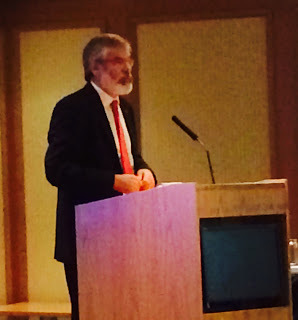 Utilising NAMA
Utilising NAMAAch cinnte tá fadhbanna eile ann roimh mhuintir Bhaile Átha Cliath.
A shortage of office space is a real problem, particularly in the city centre.
Sinn Féin has called for a renewed emphasis on the use of NAMA development funds here in Ireland.
In the past, NAMA’s development funding has been skewed away from Ireland, which is wrong.
This is despite the fact that the large bulk of NAMA loans are Irish.
This imbalance must be addressed in the time ahead.
NAMA's current funding activities are focused on shortages in the Dublin office and residential sectors.
NAMA initiated a 3-year plan in 2014 for 4,500 new residential properties in the Dublin area and the delivery of key Grade A office, retail and residential space in the Dublin Docklands Strategic Development Zone (SDZ) and wider central business district.
NAMA has indicated that, if required, it could advance a further €3 billion over the remainder of its life to support the delivery of Grade A office space and residential development in Dublin and in key urban centres in which debtor and receiver properties are located.
While this funding is dependent on planning, cost evaluations and demand, we believe it can be used as stimulus for the construction sector at a time when there is a need for both housing and commercial property in Dublin and across the state.
Tax breaks/development levies
There is no single solution to the shortage of office space in Dublin.
Even those economists who advocate for tax breaks accept they have not always worked.
Dublin Chambers has called for a 2-year waiver on development levies to address the shortage of offices, housing and hotel space.
This is a big ask and if pursued needs to be accurately quantified.
If the predicted additional revenues were realised, Dublin’s local authorities would still need to provide for the lost revenue during the waiver period.
There are many lessons to be learned from the macroeconomic mistakes made since 2001.
In that time hard won gains in employment, living standards and infrastructure were squandered.
All mechanisms to address critical infrastructural deficits that hinder growth and employment must be on the table.
But so too must be the cost/benefit checks and balances to ensure history doesn’t repeat itself.
Public Procurement
Sinn Féin wants to maximise the value of public procurement which amounts to about €12 billion annually in goods, services and capital projects.
I note that Chambers Ireland has described a continued sense of frustration amongst SMEs at the Government’s focus on the lowest tender price above wider social and economic benefits.
Sinn Féin has argued that public procurement acts as a critical stimulus for the domestic economy.
It is an important driver for recovery both in terms of employment and employment standards across the economy.
Sinn Féin's has set out a number of recommendations to increase the participation in public procurement tendering of SMEs, particularly micro and small businesses.
We also note the new EU Directive on Public Procurement provides SMEs and their representatives with an opportunity to make a increased demand of Government.
Budget 2016
As Budget 2016 approaches, Sinn Féin is in the process of finalising our alternative Budget proposals. This is due to be launched in the next two weeks.
Sinn Féin's budgets are costed in full by the Departments of Finance and Public Expenditure and have withstood public scrutiny by senior economists.
Of course budgets are not just about balancing the books.
They also offer an opportunity for the opposition to set out our alternatives to the Government’s policy agenda.
Sinn Féin's budget submission for 2016 will include measures to support and encourage business and entrepreneurship.
Dublin Chambers has set a very clear policy agenda in relation to Budget 2016.
You have also set out more long term proposals.
These include tripling of investment in Dublin’s infrastructure and a new water supply for the Eastern and Midlands region.
These are ambitious goals and Sinn Féin looks forward to a continued engagement with Chambers on how these can be best addressed.
Dublin Chambers has specific demands regarding taxation.
While our methods may differ we share an objective in making a taxation system that is fair.
We have long called for a more progressive approach to commercial rates and have committed to pursue this matter in government.
As with all taxation measures, new taxation expenditure must be found elsewhere.
That is why the costing element of any taxation or expenditure proposals is so central to budget preparations.
Sinn Féin’s first response to the emerging recession in 2008 was to publish a detailed job retention and creation document.
We have retained a focus on jobs since, through numerous policy papers and our work in the political institutions.
We support the proposition that business is a critical component in the economic and societal landscape.
As a political party we must address all of these components.
As republicans we do so in a manner that is fair to all – businesses and citizens alike.
The massive shortfalls in investment and the failure of political leadership by successive of governments are causing fundamental fissures in our society and economy.Businesses and citizens alike will pay an extraordinary cost if we do not plan for the medium and long term, particularly in the policy areas of housing, childcare and health.
If you ask our best and brightest why they are still emigrating, they will cite poor pay, lack of career progression opportunities, poor access to housing and childcare costs.
Sinn Féin's understands that we must support enterprise to ensure work pays, businesses can grow and new entrepreneurs can flourish.
This will require investment to address serious infrastructural deficits.
These are just some of the challenges we face in developing a programme that achieves our objective of delivering a fair recovery.
Sinn Féin is ambitious for Ireland, we are proud of our workforce and we understand that we do our business in a fast paced, globalised world.
There are numerous policy areas on which we must enhance our shared discussion.
These include Transport, Dublin’s water supply and how we can boost indigenous e-commerce trade to stem the excessive leakage of sales outside the state.
We won’t always agree on everything.
As a progressive political party Sinn Féin has a duty to consider all sections of society and the economy.
We passionately believe that inequality is bad for society, bad for the economy and bad for business.
We want to deliver the best and fairest result for all.
If I am to impart one key message from today’s event, it is that we in Sinn Féin are pro-business, just as we are pro-citizen and pro-fair play.
Sinn Féin accepts the need to work harder to build our relationship with enterprise and those who represent you.
We won’t be able to do all that you ask of us, but we assure you that our door is always open and we will work with you to deliver the fairest outcome. Go raibh maith agaibh.
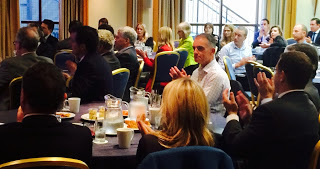
Published on September 22, 2015 07:02
September 18, 2015
Uncomfortable Conversations for Reconciliation
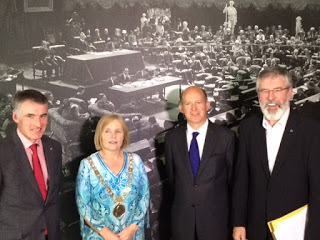 Declan Kearney, Cllr Críona Ní Dhálaigh, Dominick Chilcott, Gerry Adams
Declan Kearney, Cllr Críona Ní Dhálaigh, Dominick Chilcott, Gerry AdamsUncomfortable Conversations – An Initiative for Dialogue towards Reconciliation is a book published by Sinn Féin which contains contributions from key figures in the Churches, academia and wider civic society, as well as senior republican figures.
On Thursday in Dublin the Mansion House was the scene for the southern launch of the book. The Mayor of Dublin, Sinn Féin Councillor Críona Ní Dhálaigh, welcomed everyone to the event which was hosted by the party’s National Chairperson Declan Kearney, who was responsible for collating the articles first published in An Phoblacht.
The speakers included Rev Dr. Heather Morris who in 2012 was elected as the Methodist Church in Ireland’s first female President; the British Ambassador to Dublin Dominick Chilcott; agus mise.
Below is the text of my remarks:
Building new relationships
Ard Mhéara, Ambassador, Reverend Morris, agus a chairde.
I am very pleased to have been invited to speak at this launch of "Uncomfortable Conversations for Reconciliation" by Declan Kearney.
The islands of Ireland and Britain have had a long, entangled, conflicted and tragic relationship.
Because of our shared centuries of occupation, conflict and open war, nationalists and unionists historically have defined themselves, our cultures and aspirations in terms of our relationship with Britain.
Because of our experience of colonisation and oppression nationalists have largely rejected Britishness in its entirety, whilst unionists have embraced every British symbol and gesture.
Consequently many unionists distrust the entire nationalist population fearing that if our respective roles are ever reversed we would imitate and repeat their excesses.
In Belfast parlance the boot would be on the other foot.
There is an onus on Irish republicans to address these fears.
We must do so in a genuine and meaningful way.
Most people in England consider anyone who comes from the island of Ireland as Irish – as Paddy’s or Patricia’s.
The same is true in the USA and Canada and elsewhere.
This can come as a shock to unionists when they travel there.
And of course England itself has changed much in recent decades.
In cities like London and Birmingham there is now a cosmopolitan mix.
Most citizens in England would have little in common with what unionists describe as ‘British culture’ most often represented by ‘blood and thunder’ loyalist marching bands and demands to walk through nationalist areas.
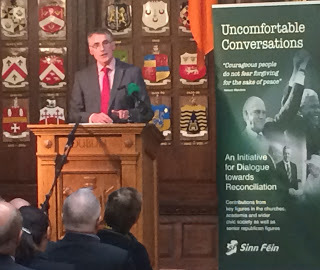 Declan Kearney
Declan KearneyAt the same time the story of colonisation and conflict has run parallel with many positive and shared experiences over the centuries.
Irish people have settled in Britain for generations.
Irish artists have contributed enormously to English literature, music and the arts.
On the sports field our people enjoy a robust and healthy rivalry.
In more recent years Irish personalities have been popular and prominent in the British entertainment industry.
The relationships between Ireland and Britain as well as those among the people of Ireland itself, are currently in transition.
Tá na caidrimh atá ann idir Éire agus an Bhreatain agus na caidrimh idir na pobail in Éirinn fosta, ag athrú anois.
The Peace Process and the Good Friday Agreement have provided the basis for building an entirely new relationship between our two islands based on partnership, equality and mutual respect.
All of us - the Irish and British governments, as well as Irish republicans, nationalists and unionists must play a full role in developing this process.
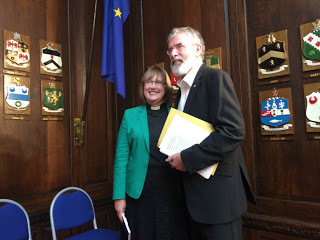 Rev Dr. Heather Morris agus mise
Rev Dr. Heather Morris agus miseAnd let us remember that it is a process. There will be ups and downs but the direction is clear.
Sinn Féin is committed to this process and to working with the political representatives of unionism to fully implement the Good Friday Agreement.
Uncomfortable Conversations opens up the pages of what is possible is people are prepared to listen and to talk to each other.
During her historic visit to Ireland in 2011, Queen Elizabeth made clear her desire to be part of a process of reconciliation and healing.
The subsequent meeting between Martin McGuinness and Queen Elizabeth in Belfast and the state visit by President Michael D Higgins to Britain were widely acknowledged as groundbreaking.
Last May, Martin McGuinness, Senator Trevor Ó Clochartaigh and I met Prince Charles in Sligo.
This arose because I originally went to the British Ambassador Dominick Chilcott and suggested the possibility of such a meeting and he worked behind the scenes to make it happen.
We had a cordial and relaxed discussion with Prince Charles. Despite some of the difficult issues we spoke of, it was a positive conversation.
We acknowledged that Charles and his family had been hurt and suffered great loss at Mullaghmore by the actions of Irish republicans.
We spoke also of the hurt inflicted on our friends and neighbours and on our own communities in Derry and Ballymurphy and Springhill by the actions of the Parachute Regiment and other British Army regiments.
He shared his own memories of the conflict starting in the 1960s. It was obvious to me that he wishes to play a positive role in making conflict a thing of the past.
Thankfully the conflict is now over.
The past is not another country; it shapes our lives, our politics and our present.
The sense of loss remains with families and communities.
I’m mindful that this week two of the disappeared were buried, and tomorrow we reinter Tomas Ceannt.
I also recognise that the Ambassador’s predecessor, Mr Ewart Biggs was killed by the IRA.
We cannot undo these things but we can work to ensure that they are never repeated.
We can work to reconcile ourselves to each other and to the past. To build a future based on equality, respect and inclusion.
So, the peace must be sustained. It needs to be nurtured. It needs to be inclusive.
The resolve and responsibility of all political leaders now must be to ensure this; to ensure that no else suffers as a result of conflict; that no other family is bereaved; that the experience of war and of loss and injury is never repeated.
This means all of us working together. It requires generosity and respect from all and for all.
The British government has a key role in encouraging and developing this process of healing and reconciliation. It must act on this. Mr. Cameron’s government has not done so.
Victims and survivors of the conflict, who are still seeking justice and truth, must be given the strongest possible support and assistance.
Whether they were bereaved by the IRA, by British state agencies, or through collusion with unionist paramilitaries, the victims and their families and communities deserve justice. That is an essential ingredient in the reconciliation process.
I know only too well from speaking directly to families of victims of the conflict, including victims of the IRA, that the past is part of their present.
I also know from talking to these families that closure and healing is possible.
For that reason the Stormont House Agreement which deals with these matters must be implemented.
When we speak about reconciliation it cannot be confined merely to a reconciliation between this state and the British state.
What is required is a genuine process of reconciliation between the people of the island of Ireland and Britain, between North and South and between the various traditions on this island.
Reconciliation must go beyond the big houses and palaces. It must be felt on the streets of Belfast and Derry and everywhere else.
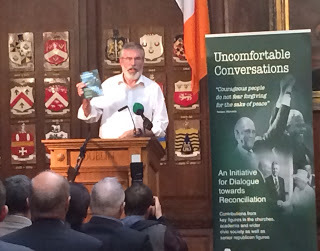
Forgiveness is also and important element in all of this.
Many years ago during the 1970s I was arrested and taken for interrogation by the British Army and RUC. British soldiers beat me unconscious several times in the course of this. On one occasion a British Army doctor came in to see if I was fit for the beatings to continue.
Many years later I was in Parliament Buildings when this wee man came up to me and said; “I used to be a British soldier and I battered you when you were arrested and I’m sorry.”
I said: “Do you promise not to do it again?”
We shook hands and he went off happy and so did I.
Reflect on this. If Martin McGuinness and Sinn Féin had not taken our recent initiatives the people of the north, despite the presence of the President, would not have felt part of those historic developments.
In fact many may have felt alienated from this state as well as the British state in Ireland.
So any future initiatives must try to involve those communities in the north who have borne the brunt of the conflict.
This should include the consistent and non-threatening presence of Irish government ministers in all communities in the north working to break down misunderstanding, to assist regenerational work and to build working relationships.
It also must include the government here delivering on important projects like the Narrow Water Bridge, the A5 motorway and delivering on cross border co-operation.
It must have a tangible presence in those communities who have borne the brunt of the conflict.
The North has been transformed in recent years by the peace process.
However it remains a work in progress.
As we have witnessed in recent weeks, there are serious and significant challenges facing the political Institutions established by the Good Friday Agreement.
Nobody is well served by the current machinations at Stormont.
Let’s remind ourselves that the pledge of office taken by Ministers in the Executive commits them to discharging their duties of office in good faith and to serve all the people of the north “equally, and to act in accordance with the general obligations on government to promote equality and prevent discrimination.”
The Code of Conduct demands that Ministers “operate in a way conducive to promoting good community relations and equality of treatment.”
How are these commitments honoured by resigning or standing aside from Ministerial office one week, only to be reinstated in post a week later, and to then resign again?
How does this assist the efforts to resolve the crisis or build confidence in the political process?
I welcome Peter Robinson’s indication yesterday that he will join the talks on Monday.
Mr. Robinson knows that there is an urgent need for real talks to commence and solutions found.
Sinn Féin is up for that and that should be the goal of all political parties.
Building on the peace and developing reconciliation is not just a matter for people in the North.
There is a particular responsibility also on leaders in this state, in the government and in Opposition - and let me say also - in the media, to deal with legacy issues in a way which takes us all beyond invective.
The partitionist mindset in this part of the island poses particular difficulties.
The government and its permanent government – the civil service – think in 26 county terms.
A recent example of this was Labour Minister Aodhan O Riordain tweeting his annoyance at the branding of a chicken product from Tyrone as ‘Irish’.
So too is Micheál Martin’s call for the suspension of the political institutions of the Good Friday Agreement and the Taoiseach’s support for the DUP’s move to adjourn the Assembly.
Policy decisions in this state on the economy, on planning, on health and education and infrastructure are all generally taken in that context.
They need to broaden out and have an all-island context.
There have been some exceptions as a result of the north-south bodies established under the Good Friday Agreement.
The policy makers have to think outside the narrow frame of partition.
Greater cohesion and co-operation and the normalising of relations would be good for every part of this island, especially the border region.
I have always regarded reconciliation as a personal issue. There are things such as the Partition of Ireland to which I and most Irish people will never be reconciled.
However, as an Irish republican I believe fundamentally in what Wolfe Tone termed a 'cordial union' between all our people.
I firmly contend that all those of us who, want to see a united Ireland have a duty to reach out, to stretch themselves, to go the extra mile.
The united Ireland that emerges in the future may not be the one traditionally envisaged over the years.
But it must be pluralist, inclusive and accommodating to all our people in all their diversity including those citizens who currently regard themselves as British
Orange is one of our national colours.
There will be Orange parades in a united Ireland.
I would appeal directly today to the Orange Order to also begin playing its part in the Peace Process by following the example set by Queen Elizabeth.
I would remind people also of the words of Britain's King George V Message on 7th June, 1921:
"May this historic gathering be the prelude of a day in which the Irish people, North and South, under one Parliament or two, as those Parliaments may themselves decide, shall work together in common love for Ireland upon the sure foundations of mutual justice and respect."
So, we need republicans need to be open, imaginative and accommodating in our approach to achieving Irish unity.
We must be open to listening to unionism about what they believe are the virtues of the union.
We need to look at what they mean by their sense of Britishness and be willing to explore and to be open to new concepts.
We need to look at ways in which the unionist people can be comfortable and secure; ways in which they have real ownership in a new Ireland.
We need to able to consider transitional arrangements which could mean continued devolution to Belfast within an all-Ireland structure.
While much of the history of our two islands has been marked by sadness and tragedy, we now have a unique opportunity to be the authors of a new, peaceful, hopeful and exciting chapter.
To forge a new chapter of peace and reconciliation in our long history of division and conflict.
The future is not written yet.
All the people of this island and the governments of these islands can do this. Together.
Sinn Féin is up for that challenge. I know others within unionism and the British establishment who are also.
I believe we can do it – all of us working together.
It needs political will and a vision of a new Ireland that appreciates that Ireland is the island and the people of the island.
That is our challenge and our opportunity.
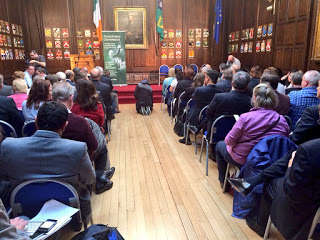
Published on September 18, 2015 03:58
Political institutions hanging by a threat
The political institutions established under the Good Friday Agreement in 1998 hang by a thread. The historic agreement which internationally stands as a beacon of hope for efforts to advance conflict resolution processes in other trouble spots around the world, is now at the point of collapse. Of the many crises faced since the Agreement was achieved over 17 years ago this is probably the most dangerous, both because of its contrived nature and because the issues at its core should not be matters for the politicians and political institutions but for the police.
It is now clear after the arrest and then release of Bobby Storey last week that the grave concerns Sinn Féin has expressed about recent events; how they occurred, and how they were subsequently handled, are entirely justified. As Bobby pointed out in his press conference on Sunday; “The PSNI had no basis for arresting me. At no time during my detention did the police present a shred of evidence or intelligence, which in either my opinion or the opinion of my solicitor, warranted my arrest. Questions must be asked about the timing and nature of my wrongful arrest.”
It is also important to note that the British Secretary of State knew two days before his arrest that Bobby was to be lifted by the PSNI. Some in the media were briefed also, as were some unionist politicians.
The question that must be asked is whose agenda is being served by this crisis and by the spin and the arrests. It is certainly not Sinn Féin’s. It is also now obvious that the Ulster Unionist Party has sought to exploit these murders for very narrow party political reasons.
The DUP’s electoral pact with the UUP during the Westminster election, which saw the UUP take Fermanagh South Tyrone and the DUP’s south Antrim seat, has emboldened that party. Afraid of being gobbled up by the DUP or Jim Allister’s TUV, the UUP leader Mike Nesbitt has embarked on a political strategy to present his party as effective in challenging republicans and the DUP as impotent. Hence this contrived crisis. Thus far Nesbitt has succeeded even though there have been extraordinary moments of incoherence, contradictions and confusion during his contribution to debates on recent news programmes.
Sinn Féin’s position was well articulated by Bobby Storey on Sunday during his press conference. ‘The IRA is gone, stood down. It’s not coming back. The only republican organisation is Sinn Féin. The only republican leadership is the Sinn Féin leadership.’
It is important also to remember that there are other matters tied up in this crisis. These include the absence of a workable budget, outstanding issues arising from the Good Friday and other agreements, including Acht na Gaeilge, a Bill of Rights and the failure to implement the Stormont House Agreement.
The threat by the British Secretary of State that she will legislate on welfare matters is not helpful. It is however typical of the approach of this British government to the process. For almost five years it disconnected from the agreement. So too did the Irish government. As co-equal guarantors of the Good Friday Agreement their responsibility is to uphold its integrity and implement it in full.
The Taoiseach needs to make the north a priority. Over the last few years he has virtually abandoned his responsibilities. It is a reality that clumsy interventions at times of crisis are no substitute for long-term engagement and the strategic consistency which is what is required.
For our part Sinn Féin will respond to all of these events in a calm and reasonable manner. We refuse to kneejerk. Sinn Féin will also engage in any talks in good faith and determined to find resolutions and agreement on all outstanding matters. But We will not accept or tolerate a situation in which the democratic rights of our electorate are not recognised and valued on the same basis as those of other parties.
Nor will be lectured to by unionist parties who turn a blind eye to loyalist violence and who work with loyalist paramilitary groups in pursuit of mutually agreed political objectives – like getting sectarian marches through nationalist areas.
The unionist parties’ attitude to the murders of Jock Davison and Kevin McGuigan in Belfast and to the recent revelations about the sell-off of NAMAs northern loan book for a third of its value of £4.5 billion, as well as allegations that a senior politician in the north was to benefit from this, are all evidence of their ad hoc attitude to the political institutions.
Sinn Féin could have decided to walk away from the Executive over the NAMA issue. We didn’t. We asserted the primacy of due process and the need for these very serious allegations of political corruption to be fully investigated by the relevant Assembly and policing agencies.
The negative unionist approach comes from its difficulties in coming to terms with the new political dispensation. They want to have political power on their own terms and not on the basis of equality, as set out in a series of agreements. Pandering by both governments to Unionism has reinforced this tendency.
It is obvious that the manner in which the DUP and the UUP are treating the institutions is seriously damaging public confidence in politics. In the longer term Unionism will be freed and liberated by the ending of partition and the union. These are the causes of the dysfunctionality which regularly surfaces in the political institutions and the contradictions between the rhetoric of unionist leaders and their actions.
In the immediate short term it is obvious that the parties in the North and the two Governments need to live up to our obligations and to do the work we are well paid to do. A starting point should be to support the police in their work.
The police for their part also have questions to answer but that too should be done in the appropriate way and through the appropriate accountability mechanism. Police should be above politics. It has no place in the political processes.
Published on September 18, 2015 02:32
September 10, 2015
Refugees: The Road to compassion
There are some images that have seared their way into the collective consciousness of humanity. Most are traumatic. In my lifetime the screaming face of a naked young girl – Kim Phuc – badly burned from a napalm attack, running down a road, as US troops in Vietnam looked on, is one. Fr. Edward Daly frantically waving a blood stained handerchief as a group of frightened men pass British soldiers carrying the body of another who was shot during the British Paras assault in Derry on Bloody Sunday is another. Soweto in 1976 and school children taking on the military might of the apartheid south African regime. Four little babies, in blood splattered white shrouds, lying in an ice-cream freezer in Gaza last summer. The rubble of the Shankill as dust covered men and women desperately scramble through rubble trying to find survivors.We each have our own memories of these and other events. Where we were when we saw them. The emotional jolt. The sadness, the shock, mixed with anger, which often turned to outrage. Sometimes the image lifts the spirit. Rekindles our belief in humanity. Whether it was ordinary citizens taking hammers and sledge hammers to the Berlin Wall or the release of Nelson Mandela.But most frequently the image is violent and distressing. Despite this the public and personal reaction is often shortlived as the next shocking image or piece of film, of the next atrocity, emerges onto our television screens or newspapers. They rarely have a lasting political impact. The image comes and goes. It remains in our memories. But the media move on to the next event and the political leaders and governments, having expressed their condemnation, put it behind them.But there are exceptions. The harrowing and distressing photo last week of three year old Aylan Kurdi lying on a beach in Turkey is one of these. How many times have you walked into a bedroom and looked into a cot, or onto a bed, and watched your son or daughter or grandchild lying peacefully asleep with their face pressed into the mattress and backside sticking up defiantly? But Aylan was not asleep. His death was not peaceful. He had died with his five year old brother Galip and mother Rihan and seven other refugees trying to cross the five dangerous miles from Turkey – which is outside the EU –to the Greek island of Kos which is inside the EU. Like so many other instances we have heard of in recent months the boat was too flimsy and the sea too rough. In April as many as 700 men, women and children died when a boat carrying refugees sank about 60 miles off the coast of Libya. In response to this disaster and other incidents in which boats sank and people drowned the EU increased its naval presence in the region. The Irish government dispatched the Lé Eithne in May. During its tour of duty it saved thousands. Lieutenant Commander Eric Timon said: "The numbers of people fleeing Africa for whatever reason... casting themselves adrift on unseaworthy vessels in the hope of rescue or the hope of reaching European shores, it's quite extraordinary.”The Lé Eithne was replaced by Lé Niamh. Together they have rescued an astounding five and a half thousand people. Lé Samuel Beckett will shortly take over this essential humanitarian work. If the Irish boats hadn’t been there all of those people might well have died.Despite the efforts of the Irish naval vessels and others from many countries the deaths are continuing. Last week as the world mourned a little Syrian child and grieved with his father for the family he has lost another 200 refugees drowned less than a mile off the Libyan coast. Some had been locked in the hold of the ship unable to escape.So far this year over two and a half thousand have died in the Mediterranean Sea. But now the media and political focus has shifted. Thousands of desperate Syrians, Eritreans, Kurds, and others have taken to the roads of Europe. They are walking hundreds of kilometres from Greece, up through the Balkans, to Germany. The Hungarian government has behaved shamefully but ordinary citizens along their route have demonstrated great compassion to this unfolding human tragedy.It was into this crisis that the dreadful image of Aylan Kurdi has injected a greater sense of political momentum. Germany has said it will take up to a million refugees. Other states have been less forthcoming as their governments enter into a new round of negotiations to discuss how they will respond to this crisis.The cynic in me says that the more positive noises in recent days from European governments has less to do with the photo of a dead child on a beach and more to do with the countless thousands of refugees who are on the roads of Europe – no longer penned in to camps or ports in Italy and Greece. This is a human catastrophe that can no longer be ignored or politically defused with a quota agreement that targets 40,000 when hundreds of thousands – millions – are on the move.Martin McGuinness moved quickly to argue that the north should take several thousand refugees. The Irish government is still deciding what it should do but it is difficult to see how it cannot agree to substantially increase the miserly 600 it was to take under the previous quota system. It needs to decide this quickly and to respond generously.Perhaps it’s because we are an island people, colonised for centuries, who have been forced to flee in our millions for freedom and work or perhaps it’s because we naturally abhor injustice. But whatever the reason the public response has been amazing. Thousands of offers of accommodation and help, including collections of clothing, have been made. Ordinary citizens have opened their hearts and are pledging to open their homes also to aid those in need. The governments of Europe have a responsibility to do more. It was their greed and imperial ambitions that created the context for much of this crisis 100 years ago. It was the political and military decisions they have taken in the decades since, and mostly recently in respect of Palestine, Iraq, Syria, Libya and Afghanistan, that have shaped the violent maelstrom that is gripping the Middle East and north Africa. In Syria alone hundreds of thousands have died; seven million citizens have been disposed of their homes and communities within the country and more than five million are scattered in refugee camps in surrounding states.The conditions in the camps are appalling and are set to get worse. The United Nations humanitarian agencies have no money and cannot meet the needs of millions. In recent months food rations for Syrian refugees in Lebanon and Jordan, as well as in north Africa have been cut. Many health care services run by the UN in Iraq have been closed. Last month 184 health clinics run by the World Health Organisation in Iraq were also closed. WHO needs $60 million for Iraq. Thus far it has only raised $5 million. A recent report in the Guardian newspaper quoted one Syrian refugee, Fatmeh, who said of her two children in Lebanon: “When we can’t afford both medicine and food, I tie scarves around my boys’ bellies at night so they don’t wake up crying from stomach aches because they are hungry.”Is it any wonder that families have chosen to make the perilous journey to Europe? It’s time that the EU institutions, European governments and Mr. Kenny and his colleagues, agreed to be as generous and as imaginative and as compassionate as this crisis demands of them.
Published on September 10, 2015 09:09
September 8, 2015
It’s about elections - stupid
In my weekly column for the Andersonstown News I wrote last week about the current political crisis. Today the talks begin.
This week 21 years ago the IRA announced its “complete cessation of military operations”. It was a momentous decision that came after many years of intense and difficult hard work. It provided, as Seamus Heaney insightfully put it at the time, a “space in which hope can grow.”But the process that followed proved torturously slow. At times it collapsed. Hope was often in short supply. The British conservative government under John Major were reluctant participants who erected one hurdle after another in an attempt to stymie progress. Ian Paisley claimed the IRA cessation was the worst crisis in the history of the northern state and Jim Molyneaux, the leader of the Ulster Unionist Party – then the biggest of the unionist parties – described it as one of the most destabilising events for unionism and the Orange state since Partition. These attitudes have largely shaped the character and approach of political unionism since then.Republicans and nationalists have focussed on achieving the maximum change, the greatest progress and to secure the full implementation of the Good Friday Agreement. Unionist leaders have sought to minimise progress and dilute change. Successive British governments, generally backed by compliant and insipid Irish governments, have consistently backed political unionism.The internal electoral battle within unionism – primarily between the UUP and DUP, but now also involving Jim Allister’s Traditional Unionist Voice - has also played a significant role as each unionist party seeks to win voters. The current political crisis is the latest manifestation of this. The UUP decision to walk out of the Executive was no surprise. Mike Nesbitt claims that the decision is about taking a ‘principled stand’. Few believe him. Four years ago the Ulster Unionist Party was in decline. It was desperately trying to carve out an electoral niche for itself, separate from the DUP. As part of this the then leader Tom Elliot argued for the creation of an opposition in the Assembly. A Belfast Telegraph opinion poll claimed that 80% of delegates to the party’s annual conference in 2011 supported this.The following year the UUPs new leader Mike Nesbitt called for the ‘introduction of an official opposition.’Last year Reg Empey another former leader, tabled an amendment in the British Parliament to the ‘Northern Ireland (Miscellaneous Provisions) Bill’ which would enable the introduction of an opposition in the Assembly. And he was supported in this by John Taylor, who at the beginning of this year publicly called for the UUP to go into opposition.As explained by Taylor the rationale for such a move was because the Ulster Unionists were ‘losing ground politically.’ Mike Nesbitt’s ‘principled stand’ is therefore the fulfillment of a long standing objective of the UUP - to go into opposition in the Assembly. At its most cynical it’s about electoralism – it’s about winning votes and taking seats. The once all powerful UUP – which ruled the north for 50 years - has been pushed to the margins. However, in May the UUP won two Westminster seats in the British general election – ironically in Fermanagh South Tyrone with the help of the DUP – and Nesbitt now sees a further opportunity to resurrect the electoral fortunes of his party.His decision to exploit the brutal murder of Kevin McGuigan is about positioning the UUP as the party of leadership within unionism. The same electoral motivation is at work south of the border. The government parties – Fine Gael and Labour - and Fianna Fáil are setting aside the imperative of peace in order to ally themselves with the northern unionist parties to attack Sinn Féin. This is short term narrow party political self-interest taking precedence over the peace process. This is a contemptible approach.Sinn Féin’s condemnation of the murders of Jock Davison and Kevin McGuigan has been forthright and unequivocal. So too is our support for the PSNI in their investigation and efforts to bring those responsible before the courts.Sinn Féin rejects any attempt to undermine the rights and entitlements of our electorate because of the actions of criminals.In their desire to try and bolster the fortunes of their parties through attacking Sinn Féin the government parties and Fianna Fáil need to be mindful that the DUP and UUP have never been enthusiastic partners in the power sharing institutions. They were each brought grudgingly and reluctantly to participate in the Good Friday Agreement institutions. Both parties remain wedded to the notion of majority rule. Peter Robinson in an interview only five months ago with the Economist said: “My view is that we should be moving to a voluntary coalition rather than a mandatory coalition, so that people who are like-minded form the government rather than being forced with people who are ideologically not only different, but opposites to each other being in the executive.”If unionism succeeds in overturning the Good Friday Agreement, collapsing the power sharing structures, and turning the clock back to the bad days of majority rule, the political consequences for the island of Ireland will be very serious.Now is the time for real leadership. To put the needs of the peace process front and centre. Since that historic IRA cessation on August 31st1994 Sinn Féin and republicans have taken significant risks for peace and in support of the political process. If a resolution of the current crisis is to be achieved then sectional electoral interests and narrow party politicking needs to be pushed aside.Any negotiations must focus on the real issues; the outstanding elements of the Good Friday Agreement and the implementation of the Stormont House Agreement. Anything less is not acceptable.
This week 21 years ago the IRA announced its “complete cessation of military operations”. It was a momentous decision that came after many years of intense and difficult hard work. It provided, as Seamus Heaney insightfully put it at the time, a “space in which hope can grow.”But the process that followed proved torturously slow. At times it collapsed. Hope was often in short supply. The British conservative government under John Major were reluctant participants who erected one hurdle after another in an attempt to stymie progress. Ian Paisley claimed the IRA cessation was the worst crisis in the history of the northern state and Jim Molyneaux, the leader of the Ulster Unionist Party – then the biggest of the unionist parties – described it as one of the most destabilising events for unionism and the Orange state since Partition. These attitudes have largely shaped the character and approach of political unionism since then.Republicans and nationalists have focussed on achieving the maximum change, the greatest progress and to secure the full implementation of the Good Friday Agreement. Unionist leaders have sought to minimise progress and dilute change. Successive British governments, generally backed by compliant and insipid Irish governments, have consistently backed political unionism.The internal electoral battle within unionism – primarily between the UUP and DUP, but now also involving Jim Allister’s Traditional Unionist Voice - has also played a significant role as each unionist party seeks to win voters. The current political crisis is the latest manifestation of this. The UUP decision to walk out of the Executive was no surprise. Mike Nesbitt claims that the decision is about taking a ‘principled stand’. Few believe him. Four years ago the Ulster Unionist Party was in decline. It was desperately trying to carve out an electoral niche for itself, separate from the DUP. As part of this the then leader Tom Elliot argued for the creation of an opposition in the Assembly. A Belfast Telegraph opinion poll claimed that 80% of delegates to the party’s annual conference in 2011 supported this.The following year the UUPs new leader Mike Nesbitt called for the ‘introduction of an official opposition.’Last year Reg Empey another former leader, tabled an amendment in the British Parliament to the ‘Northern Ireland (Miscellaneous Provisions) Bill’ which would enable the introduction of an opposition in the Assembly. And he was supported in this by John Taylor, who at the beginning of this year publicly called for the UUP to go into opposition.As explained by Taylor the rationale for such a move was because the Ulster Unionists were ‘losing ground politically.’ Mike Nesbitt’s ‘principled stand’ is therefore the fulfillment of a long standing objective of the UUP - to go into opposition in the Assembly. At its most cynical it’s about electoralism – it’s about winning votes and taking seats. The once all powerful UUP – which ruled the north for 50 years - has been pushed to the margins. However, in May the UUP won two Westminster seats in the British general election – ironically in Fermanagh South Tyrone with the help of the DUP – and Nesbitt now sees a further opportunity to resurrect the electoral fortunes of his party.His decision to exploit the brutal murder of Kevin McGuigan is about positioning the UUP as the party of leadership within unionism. The same electoral motivation is at work south of the border. The government parties – Fine Gael and Labour - and Fianna Fáil are setting aside the imperative of peace in order to ally themselves with the northern unionist parties to attack Sinn Féin. This is short term narrow party political self-interest taking precedence over the peace process. This is a contemptible approach.Sinn Féin’s condemnation of the murders of Jock Davison and Kevin McGuigan has been forthright and unequivocal. So too is our support for the PSNI in their investigation and efforts to bring those responsible before the courts.Sinn Féin rejects any attempt to undermine the rights and entitlements of our electorate because of the actions of criminals.In their desire to try and bolster the fortunes of their parties through attacking Sinn Féin the government parties and Fianna Fáil need to be mindful that the DUP and UUP have never been enthusiastic partners in the power sharing institutions. They were each brought grudgingly and reluctantly to participate in the Good Friday Agreement institutions. Both parties remain wedded to the notion of majority rule. Peter Robinson in an interview only five months ago with the Economist said: “My view is that we should be moving to a voluntary coalition rather than a mandatory coalition, so that people who are like-minded form the government rather than being forced with people who are ideologically not only different, but opposites to each other being in the executive.”If unionism succeeds in overturning the Good Friday Agreement, collapsing the power sharing structures, and turning the clock back to the bad days of majority rule, the political consequences for the island of Ireland will be very serious.Now is the time for real leadership. To put the needs of the peace process front and centre. Since that historic IRA cessation on August 31st1994 Sinn Féin and republicans have taken significant risks for peace and in support of the political process. If a resolution of the current crisis is to be achieved then sectional electoral interests and narrow party politicking needs to be pushed aside.Any negotiations must focus on the real issues; the outstanding elements of the Good Friday Agreement and the implementation of the Stormont House Agreement. Anything less is not acceptable.
Published on September 08, 2015 04:37
Remembering Garrett O Connor
Dr. Garrett O’Connor was a world renowned psychiatrist. Last week dh died peacefully in his sleep at home in Aughrim, Co. Wicklow. Garrett was married to the equally well known actress Fionnula Flanagan. He was recognised for work in the field of alcohol addiction and was the president and CEO of the Betty Ford Institute. Garrett was originally from Dublin.His funeral took place on Saturday and I was one of those who spoke at the ceremony.Below is my oration.
Oration for Garrett O Connor:
Ba mhaith liom mo chombhrón agus bá a dhéanamh le Fionnuala, Mathew, Turlough, Mary Lee, Julie and Mary.Agus do clan uilig O Connor, do na cairde’s leathbhádóiri or fadh trasna an Domhan.It was my great privilege to know Garrett, not as well as his close family who will feel his loss in a special intimate way, especially his beloved Fionnuala. But I am glad I knew him.It is an honour to say a few inadequate words about this insightful, articulate, creative, honest, courageous and very gifted human being.He would blush at this but in his long life he touched many people in a positive and empowering way. It should be of some consolation to his family that there are many thousands of people alive today, and tens of thousands of families, leading productive and loving lives, because of his tireless efforts in challenging alcohol abuse and providing counselling and other supports for those in need.He also talked publicly and very bravely about the personal and family trauma alcoholism created in his life.Garrett’s training in addiction training and psychiatry was unmatched.For four decades he travelled widely teaching, consulting, learning, and sharing his experience and ideas with others. He and his close friend Dr. Ivor Browne were trail blazers. Under the auspices of the Irish Association of Human Development, founded by Ivor, which started initially in Ballyfermot, this work was then pioneered in Derry after Bloody Sunday with the Bogside Community Association and Paddy Doherty – Paddy Bogside. A lot of what they did there was based on experimental techniques created largely by Garrett and Ivor.So although Garrett lived for 50 years in the USA his connections with Ireland were deep and constant. He loved Ireland and the Irish people.Garrett has also written extensively and persuasively on the role of malignant shame in the Irish psyche and its connection to colonialism. He articulated his belief that the crisis created by malignant shame also extends now into the Ireland of austerity. I first met Garrett and Fionnuala exactly 21 years ago. A group of us were travelling across the USA meeting Irish American communities and political leaders. Not long after the IRA sos in 1994.On October 6th, my birthday, Garrett and Fionnuala very kindly hosted a birthday party at their home in Beverly Hills. Our friend Richard McAuley was enthralled by all of the movie stars who turned up. A reporter for the Sunday Timeswas there also skulking around outside, taking down registration numbers of parked cars. Then Fionnuala produced a birthday cake and Garrett led us in singing ‘Lá breithe shona duit’, silencing the evensong of the crickets and giving our intrepid reporter colourful copy of the front page of his next edition.Some weeks later I sent Garrett and Fionnuala wild flower seeds, mostly foxgloves or Méirini Púca which I gathered in a Glenside at the back of Errigal in Donegal. Not long afterwards Oscar, Garrett’s huge hairy Airdale died. Garrett dutifully buried the dog in the back garden – probably in breach of a thousand by-laws. Fionnuala unbeknownst to him sprinkled the wildflower seeds over Oscar’s grave.When the wildflowers bloomed, with the sight and scent of the western highlands of Donegal on the west coast of the USA, Garrett proclaimed that Oscar had performed a miracle.Garrett was a decent human being. A strong Irish patriot agus cara mór do pobal na hÉireann. Ní chífidh muid a leitheid arís ann.The author Terry Pratchett, who died recently, put it well before his death.“No one is actually dead until the ripples they cause in the world die away …”Garrett has left many ripples. But of course now will be a time of great grief for Fionnuala and those closest to Garrett. Yours is the greatest loss. Garrett would want you all to be well. I think he would approve of Brendan Kennelly’s poem Begin.This wee extract is for Fionnuala and all of the O Connor clan.Begin again to the summoning birdsTo the sight of light at the windowBegin to the loneliness that cannot endAt crying birds and the sudden rainAt branches stark in the winter sunlightTo words of greeting in the Dublin morningThough we live in a world that thinks of endingThat always seems about to give inSomething that will not acknowledge conclusionInsists that we forever beginSlan Garrett
Published on September 08, 2015 04:22
August 24, 2015
1981 Hunger Strike - inflicted a historic defeat on the Thatcher government
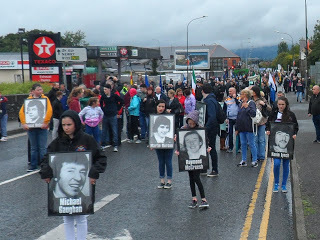 A section of the huge crowd
A section of the huge crowd
For a brief period the rain eased as we walked through Dundalk on Sunday but for most of the time it lashed. Thousands of brave souls, many soaked to the skin despite all kinds and sizes of umbrellas and coats, and led by relatives of the hunger strikers, walked the two miles from the assembly point to the centre of Dundalk where this year’s National Hunger Strike march and rally where held.The talk of many was of similar marches in the past, often in similar cold and inclement weather, during the long years of the blanket protest in the H-Blocks and in Armagh Women’s prison.
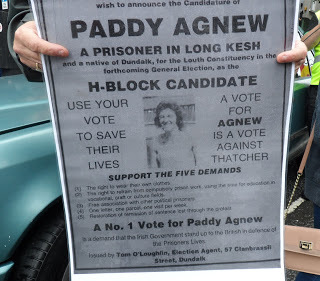 Along the route the County Louth organisers of the event had arranged for some street theatre to remind us of other days. At one place there were women holding posters shouting slogans in support of the blanket men and the Armagh women prisoners; at another spot a group was shouting slogans against strip searching; at yet another a group of women were vigorously bashing the footpath with the cleanest bin-lids I have ever seen; others were dressed as Brits and RUC; and there were still others holding posters in support of Paddy Agnew from Dundalk who famously won a Dáil seat along with Ciaran Doherty in the summer of 1981.
Along the route the County Louth organisers of the event had arranged for some street theatre to remind us of other days. At one place there were women holding posters shouting slogans in support of the blanket men and the Armagh women prisoners; at another spot a group was shouting slogans against strip searching; at yet another a group of women were vigorously bashing the footpath with the cleanest bin-lids I have ever seen; others were dressed as Brits and RUC; and there were still others holding posters in support of Paddy Agnew from Dundalk who famously won a Dáil seat along with Ciaran Doherty in the summer of 1981.
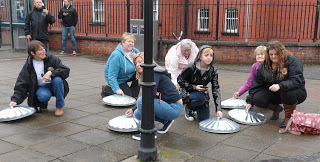
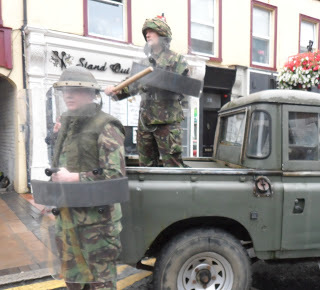
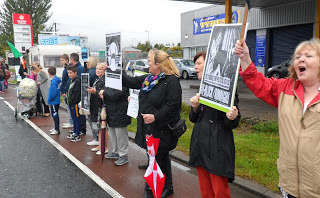 The Louth Sinn Féin team did a brilliant job of planning and organising and participating in all aspects of the event – although Flash McVeigh failed to arrange better weather. Well done to everyone who played their part.
The Louth Sinn Féin team did a brilliant job of planning and organising and participating in all aspects of the event – although Flash McVeigh failed to arrange better weather. Well done to everyone who played their part.
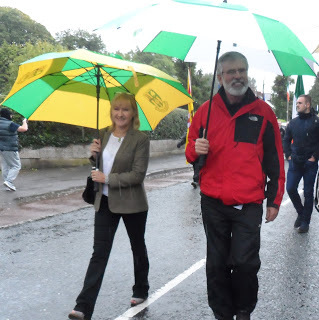 Councillor Imelda Munster agus mise
Councillor Imelda Munster agus miseCouncillor Tómas Sharkey welcomed everyone to the car park where the event was being held and Councillor Imelda Munster was an excellent chair for the proceedings. Laments were played by Patrick Martin and the last post by Harry Bellew Jr echoed across Dundalk. The Roll of Honour of all of those who died on hunger strike in the last century was read out by Shauna McKee and Niamh Morrow and Donna Lawless and Aoife Archibald read two poems by Bobby Sands.Ellen Maguire’s haunting voice carried across the huge space as she sang ‘Forever in my mind’ a song written by Christy Moore and based on a poem by Pierce McLoughlin. Ellen closed the proceedings with Amhrán na bhFiann.When I stepped forward to speak I was looking down on a sea of umbrellas. This year there were more media than usual because of the controversy around the murders of Jock Davison and Kevin McGuigan and claims by the PSNI about the IRA. Below is a transcript of my speech. While it had to address other matters it is primarily about the hunger strikers, their courage and legacy.
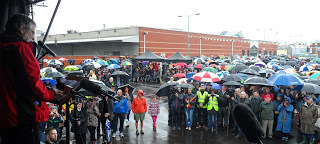 Remembering the Hunger Strikers:“I want to commend and to thank the organisers of today’s event.I also want to welcome all of you here to county Louth for this very special celebration of the lives of Bobby, Francie, Raymond, Patsy, Joe, Martin, Kevin, Kieran, Tom and Mickey.Déanann muid cuimhneachán ar Frank Stagg agus Michael Gaughan fosta.The men and women of Armagh Women’s Prison and the H Blocks, and especially the 10 men who died, hold a special place in the hearts and minds of Irish republicans.Many of us today have known other friends and comrades who were killed during the course of the conflict.Brave men and women who gave their lives in the pursuit of freedom and justice and independence.We remember them all.Déanann muid cuimhneachán orthu uilig inniu. We are proud of them all.Tá muid bródúil astu ar fad. But the 10 hunger strikers are exceptional.Perhaps it is because of the very public manner of their deaths.Perhaps it’s because as human beings we are inevitably drawn to and inspired by those who are willing to sacrifice their lives, often in desperate circumstances, to save the lives of others and in pursuit of a noble goal.Perhaps it is because we shared in the trauma and grief of the families who demonstrated enormous endurance and tenacity during those long difficult months.Their indomitable spirit and selflessness stand out as an inspiration to us all.The generosity and self-sacrifice of the hunger strikers, and the hard work and support of thousands of people across this island, inflicted a historic defeat on the Thatcher government.Like the Easter Rising of 1916, it was a watershed in Ireland’s long struggle for freedom and against British rule.The momentous election of Bobby Sands in Fermanagh South Tyrone gave the lie to the claim that the political prisoners did not enjoy popular support.Several months later in June 1981 the criminalisation policy of the British government, enthusiastically supported and implemented by successive Irish governments, suffered another body blow with the election to the Dáil of Kieran Doherty in Cavan Monaghan and the election of Paddy Agnew here in Louth.
Remembering the Hunger Strikers:“I want to commend and to thank the organisers of today’s event.I also want to welcome all of you here to county Louth for this very special celebration of the lives of Bobby, Francie, Raymond, Patsy, Joe, Martin, Kevin, Kieran, Tom and Mickey.Déanann muid cuimhneachán ar Frank Stagg agus Michael Gaughan fosta.The men and women of Armagh Women’s Prison and the H Blocks, and especially the 10 men who died, hold a special place in the hearts and minds of Irish republicans.Many of us today have known other friends and comrades who were killed during the course of the conflict.Brave men and women who gave their lives in the pursuit of freedom and justice and independence.We remember them all.Déanann muid cuimhneachán orthu uilig inniu. We are proud of them all.Tá muid bródúil astu ar fad. But the 10 hunger strikers are exceptional.Perhaps it is because of the very public manner of their deaths.Perhaps it’s because as human beings we are inevitably drawn to and inspired by those who are willing to sacrifice their lives, often in desperate circumstances, to save the lives of others and in pursuit of a noble goal.Perhaps it is because we shared in the trauma and grief of the families who demonstrated enormous endurance and tenacity during those long difficult months.Their indomitable spirit and selflessness stand out as an inspiration to us all.The generosity and self-sacrifice of the hunger strikers, and the hard work and support of thousands of people across this island, inflicted a historic defeat on the Thatcher government.Like the Easter Rising of 1916, it was a watershed in Ireland’s long struggle for freedom and against British rule.The momentous election of Bobby Sands in Fermanagh South Tyrone gave the lie to the claim that the political prisoners did not enjoy popular support.Several months later in June 1981 the criminalisation policy of the British government, enthusiastically supported and implemented by successive Irish governments, suffered another body blow with the election to the Dáil of Kieran Doherty in Cavan Monaghan and the election of Paddy Agnew here in Louth.
 As well as the election of Kieran and Paddy, Joe McDonnell came close to taking a seat in Sligo and Mairead Farrell and others won credible votes.All of this was achieved with little real organisation and no great electoral experience.I remember the first poster I saw in Dundalk during that election.It said: “Support the Prisoners, Vote Paddy Agnew No 1.” In every town and small village and sraid bhaile across Louth, there was Paddy’s face smiling down from telegraph poles, hoardings and tree trunks.I have to say he hasn’t changed a bit.Fianna Fáil and Charlie Haughey, who had thought they were on their way to another election victory, and who had treated the hunger strikers and their families so appallingly, were punished by the electorate.No party has been able to form a majority single government in this state since then.On Thursday we remembered Mickey Devine who died on that date in 1981 after 60 days on hunger strike. Mickey was the last of the ten to die.Three decades later it is clear that the 1981 hunger strike, and its electoral successes transformed the struggle.It is our responsibility to finish the work commenced by previous generations, and by the men and women of 1916 and the men and women of 1981.
As well as the election of Kieran and Paddy, Joe McDonnell came close to taking a seat in Sligo and Mairead Farrell and others won credible votes.All of this was achieved with little real organisation and no great electoral experience.I remember the first poster I saw in Dundalk during that election.It said: “Support the Prisoners, Vote Paddy Agnew No 1.” In every town and small village and sraid bhaile across Louth, there was Paddy’s face smiling down from telegraph poles, hoardings and tree trunks.I have to say he hasn’t changed a bit.Fianna Fáil and Charlie Haughey, who had thought they were on their way to another election victory, and who had treated the hunger strikers and their families so appallingly, were punished by the electorate.No party has been able to form a majority single government in this state since then.On Thursday we remembered Mickey Devine who died on that date in 1981 after 60 days on hunger strike. Mickey was the last of the ten to die.Three decades later it is clear that the 1981 hunger strike, and its electoral successes transformed the struggle.It is our responsibility to finish the work commenced by previous generations, and by the men and women of 1916 and the men and women of 1981.
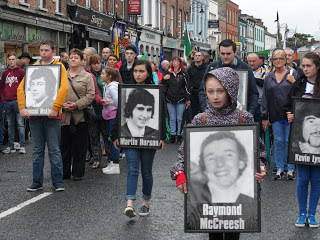
Several weeks ago Sinn Féin’s hugely successful and popular re-enactment of the funeral of O’Donovan Rossa showed what can be achieved to further popularise the struggle for freedom, as well as to celebrate the lives of national heroes.The Sinn Féin event also exposed the shallowness of the approach of Fine Gael, Labour and Fianna Fáil and of their policies.Léirigh ócáid Shinn Féin nach bhfuil Fine Gael Páirtí an Lucht Oibre nó Fianna Fáil dáiríre faoi seo.Fine Gael and Labour can rightly be blamed for the implementation of austerity policies and the dire social and economic consequences they have created.But there is no difference in policy between Fine Gael and Labour, and Fianna Fail.They will not deliver a fair recovery but more of the same old cronyism and clientelism. A general election is only months, perhaps weeks away.The Government says that a recovery is underway. If it is, it isn’t a fair recovery.It is a two tier recovery that benefits them and their friends at the top, not the majority of hard-working, fair-minded Irish citizens.Fine Gael and Labour will make one last desperate effort in October to buy the next election.We cannot and should never take the electorate for granted but I am confident that citizens will not be fooled.Sinn Féin offers a different way – a better way – to build a fair recovery.It is our responsibility to win the largest mandate possible for our party and for a fair recovery.The reality is that the leaderships of Fine Gael and Labour and Fianna Fáil long ago abandoned any real belief in the principles of equality and of rights contained in the Proclamation, or any commitment to a united, free and independent Ireland. Partitionism dominates and defines their politics. For them the struggle for Irish freedom ended with the Treaty and the Civil War. It ended with partition.But Ireland divided never can be free.So for us the struggle continues.And Sinn Féin is in the vanguard.Inniu tá an streachailt ag leanúint ar aghaidh agus tá Sinn Féin chun tosaigh.For that reason our enemies seek at every opportunity to attack our mandate, to undermine the rights and entitlements of our electorate, and to undermine the peace process.Like the men and women of Armagh and the H Blocks they seek to criminalise us.They didn’t succeed in 1981 and they won’t succeed today.The recent killings of Jock Davison and Kevin McGuigan have been opportunistically and cynically seized upon for this purpose.Let me be very clear.The killings of Jock Davison and of Kevin McGuigan were wrong.Those involved do not represent republicanism. They are not the IRA.The IRA has gone away. That organisation, undefeated, took the momentous step in 2005 and ordered an end to its armed campaign.It instructed its representatives to “engage with the IICD to complete the process to verifiably put its arms beyond use” and ordered its volunteers to take part only in “purely political and democratic programmes” and no “other activities whatsoever”. None of the many alphabet groups that now claim the proud name of the Irish Republican Army have a right to that title. They have no connection whatsoever with the men and women who bravely resisted British militarism in the 70’s, 80’s and 90’s and who defeated Thatcher in Armagh women’s prison and the H Blocks of Long Kesh. As we approach the centenary of 1916 there is no need, rationale, or reason for any armed groups whatsoever.It’s time they called an end to their sham campaigns.I have a similar blunt message for those who engage in a sham fight at Stormont on this issue in order to slow down or dilute the necessary process of change.Those who threaten to take action against Sinn Féin in the political institutions have no basis whatsoever for this.Sinn Féin’s mandate and the rights and entitlements of our electorate deserve exactly the same respect and protection as anyone else’s’. And Sinn Féin will defend that assertively and robustly.We will not be lectured to by those who have failed to honour their obligations time and again.For our part Sinn Féin has kept every commitment we have made.But today is about the hunger strikers.On July 29th 1981 along with Owen Carron and Seamus Ruddy of the IRSP I visited the H Block Hospital in Long Kesh. By this time Bobby, Francie, Raymond, Patsy, Martin and Joe were dead.We met Thomas McElwee, Laurence McKeown, Matt Devlin, Pat McGeown, Paddy Quinn and Mickey Devine and Bik McFarlane in the prison hospital. They all looked rough, prison-pale skin stretched across young skull-like faces, legs and arms indescribably thin, eyes with that penetrating look that I had often noticed among fellow prisoners in the past, and that Bobby Sands had described as "that awful stare, of the pierced or glazed eyes, the tell-tale sign of the rigours of torture." As they smiled across the table at us we relaxed and were soon deep on conversation about the stailc, the campaign, the BGs position and the well-being of their friends and families.After this meeting Bik arranged for us to go and see Kieran Doherty.
Doc was propped up on one elbow on his prison bed: his eyes, unseeing, scanned the cell as he heard us entering.I sat on the side of the bed. Doc, whom I hadn’t seen in years, looked massive in his gauntness, as his eyes, fierce in their quiet defiance, scanned my face.
I spoke to him quietly and slowly, somewhat awed by the man’s dignity and resolve."You know the score yourself," he said. "I’ve a week in me yet"He paused momentarily and reflected: "We haven’t got our five demands and that’s the only way I’m coming off. Too much suffered for too long, too many good men dead. Thatcher can’t break us. Lean ar aghaidh. I’m not a criminal.""For too long our people have been broken. The Free Staters, the church, the SDLP. We won't be broken. We'll get our five demands. If I’m dead well, the others will have them. I don't want to die, but that's up to the Brits. They think they can break us. Well they can’t."
"Tiocfaidh ár lá." I never saw Thomas McElwee, Mickey Devine, Kevin Lynch or Big Doc alive again.
How do you explain the Hunger strikes? How do you come to terms with what happened? It can be understood only if we appreciate the incorruptibility and generosity of the human spirit when that spirit is motivated by an ideal or an objective which is greater than itself.People are not born as heroes. The hunger strikers were ordinary people who in extraordinary circumstances brought our struggle to a moral platform which became a battle between them and the entire might of the British state.We Irish, all 70 million of us across this globe are no petty people.If our opponents, if our detractors, if our enemies want to understand us, if they want to understand our struggle, if they want to understand our commitment and our vision for the future, then let them come to understand the hunger strikers.For the rest of us there is peace to be made, elections to be fought and freedom to be won.As Brendan McFarlane sings in his song:We're stronger now.You showed us how.Freedom's fight can be won.If we all stand as one.Comrades, let us always remember the Armagh Woman and the Blanket men and especially the hunger strikers with pride.And let us move forward together as one. Ar aghaigh linn
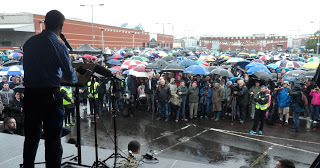 Councillor Tómas Sharkey addressing the huge crowd
Councillor Tómas Sharkey addressing the huge crowd
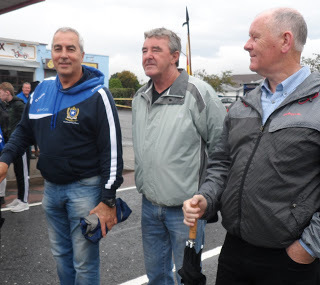 Former Hunger Striker Pat Sheehan with Paddy Agnew
Former Hunger Striker Pat Sheehan with Paddy Agnew
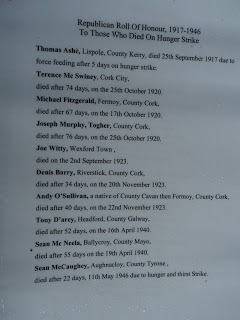
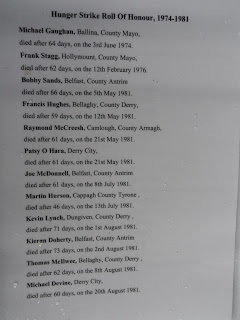
Published on August 24, 2015 03:57
Gerry Adams's Blog
- Gerry Adams's profile
- 29 followers
Gerry Adams isn't a Goodreads Author
(yet),
but they
do have a blog,
so here are some recent posts imported from
their feed.


